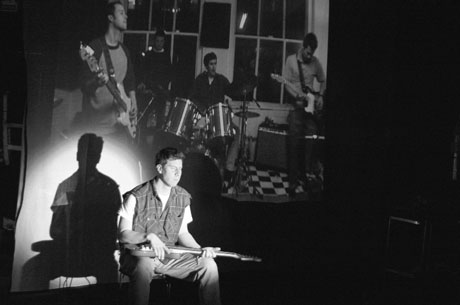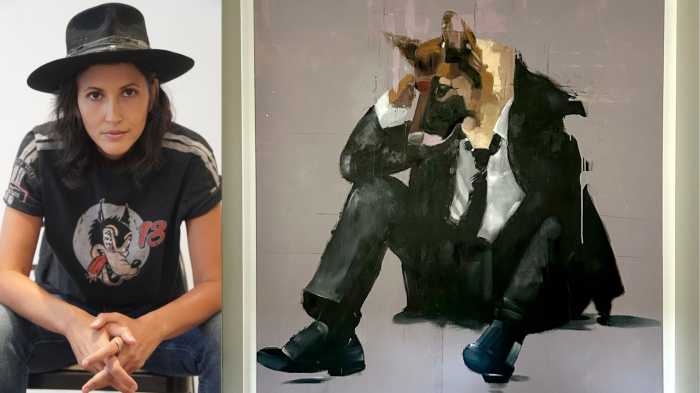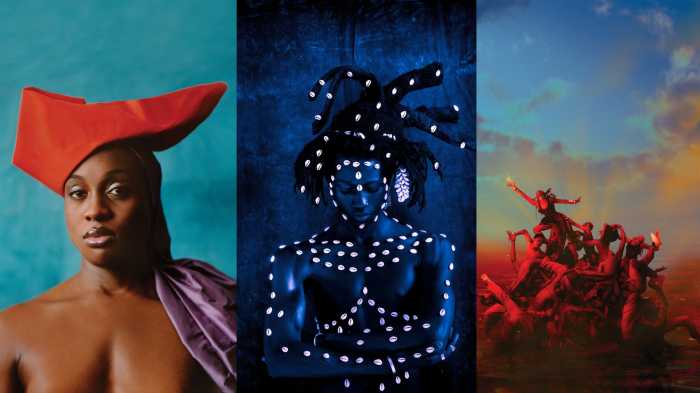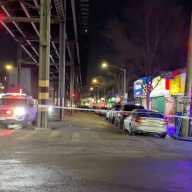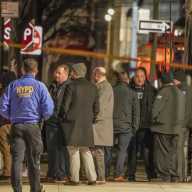By JERRY TALLMER
Here is a representative moment:
PAT McGURN, a bad guy, crooked bartender at the Double Deuce: “I’m staying and you’re going.” (Pulls out a knife and brandishes it.)
DALTON, a good guy who has killed a few bad guys here and there: “Oh, really?”
PAT McGURN, waving the knife: “Come on, Dalton. You and me, right now. Right now! What’s the matter, you chicken dick? What are you afraid of? Me? Is that it, Dalton. You scared to fight me? . . . What do you want? To kiss and make up?”
(They fight. Assorted bouncers and goons jump in. The bouncers, and most especially Dalton, royally kick ass. But Dalton gets cut. Scene shifts to hospital where Dalton has his shirt off. Dr. Elizabeth Clay enters.)
DR, CLAY: “Hi, I’m Dr. Clay. How did this happen?”
DALTON: “Natural causes.”
SHE: “You’re a bouncer?”
HE: “Double Deuce.”
SHE: “Nice place. They send a lot of business my way.”
HE: “I’m going to change all that.”
If you think you once saw all that in a movie, you did. The movie was “Road House,” a 1989 epic directed by Rowdy Herrington, in some people’s opinion the worst movie ever made, and it still plays ever and again on television stations like TNT. The stars were Patrick Swayze as clean-’em-up Dalton and Ben Gazzara as Brad Wesley, bad-guy-in-chief, boss of the whole town.
Now, taken word for word from the movie, it is here on the living stage at Barrow Street, billed as a “fightsical,” slam-bang and all.
For this we must thank Timothy Haskell, a serious-minded 29-year-old from Atlanta, Georgia, who has been visible in the New York downtown scene as a performance artist, a director of experimental theater, and, more recently, as founder of Publicity Outfitters, servicing shows that, again, run to the offbeat and experimental.
“People think ‘experimental’ means inaccessible,” Haskell said one day last week as the cast of “Road Show” trickled in at Barrow Street, “but there’s no reason you can’t experiment with a populist work of art.”
Not that he considers the “Road Show” movie a work of art.
“A lot of people have seen some part of it on TNT or wherever. Really, it’s a terrible film. I first saw it when it came out — saw it in fact with my father, in Atlanta. I was 15 or 16 years old, and I loved it. Lots of girls and lots of fighting. As you get older, you realize the flaws in it, yet it’s a very compelling film actually, not one of those films you want to turn off. You want to see what happens.”
Haskell had three motives — “three ideas” — in this project:
“One, to direct something with lots of action, as in a movie; to challenge myself in that way.
“Two, to direct something that had a brand name.
“And three, to take something that’s considered dreck — something that could never be a play — and turn it into art.
“It’s not necessarily a satire or a parody of the film, but more a deconstruction of the genre.”
In any event, there is violence aplenty — “a lot of [simulated] violence and a lot of sexuality” — in Haskell’s staging, both when “Road Show” opened to enthusiastic reviews and audiences down at La Tea on the Lower East Side for three weeks last fall, and now at Barrow Street in the Village.
You can keep your Patrick Swayze. “Road House” the play has Taimak Guariello, the black-belt kickboxing star of “The Last Dragon,” playing stoic hero Dalton in a blonde mullet (New Jesey redneck} wig, and Harry Listig handles the Ben Gazzara villain role. Rachael Roberts is Dr. Elizabeth Clay, the love interest, and Nick Arens is crooked bartender Pat.
“See that stage?” Haskell says. “It’s all pads and ropes and bungee cords, with a padded floor. The last 35 minutes is all action, climaxing with two guys fighting to the death as they fly through the air.”
All of which takes a lot of choreography. The choreographer is Haskell’s wife Rebeca Ramirez, with whom he lives up by the Cloisters, of all places — a far piece from La Tea, or Greenwich Village, or, for that matter, the Double Deuce Club, or the little town in miniature that’s projected onto a big screen whenever the action calls for it.
“All right,” says the Sheriff at the very end, “who’s gonna tell me what the hell happened here?”
“I didn’t see nothin’,” says one townsman after another.
But you’ll have seen. And maybe ducked.



